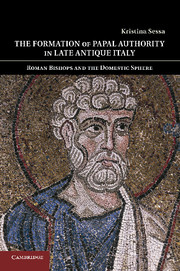Book contents
- Frontmatter
- Contents
- Acknowledgments
- Abbreviations
- Map Late Roman Italy
- Roman Bishops from Peter to Gregory I
- Introduction: Household Management and the Bishop of Rome
- Chapter 1 The Late Roman Household in Italy
- Chapter 2 From Dominion to Dispensatio: Stewardship as an Elite Ideal
- Chapter 3 Primus Cultor: Episcopal Householding in Theory and Practice
- Chapter 4 Overseeing the Overseer: Bishops and Lay Households
- Chapter 5 Cultivating the Clerical Household: Marriage, Property, and Inheritance
- Chapter 6 Mistrusting The Bishop: Succession, Stewardship, and Sex in the Laurentian Schism
- Chapter 7 The Household and The Bishop: Authority, Cooperation, and Competition in the Gesta Martyrum
- Conclusion
- Bibliography
- Index
Chapter 1 - The Late Roman Household in Italy
Published online by Cambridge University Press: 05 December 2011
- Frontmatter
- Contents
- Acknowledgments
- Abbreviations
- Map Late Roman Italy
- Roman Bishops from Peter to Gregory I
- Introduction: Household Management and the Bishop of Rome
- Chapter 1 The Late Roman Household in Italy
- Chapter 2 From Dominion to Dispensatio: Stewardship as an Elite Ideal
- Chapter 3 Primus Cultor: Episcopal Householding in Theory and Practice
- Chapter 4 Overseeing the Overseer: Bishops and Lay Households
- Chapter 5 Cultivating the Clerical Household: Marriage, Property, and Inheritance
- Chapter 6 Mistrusting The Bishop: Succession, Stewardship, and Sex in the Laurentian Schism
- Chapter 7 The Household and The Bishop: Authority, Cooperation, and Competition in the Gesta Martyrum
- Conclusion
- Bibliography
- Index
Summary
The domestic sphere was central to ancient conceptions of power and authority. Classical thinkers stressed the inextricable connections between a man's ability to conduct his household affairs and his capacities as a public leader. In Tacitus’ words, keeping a household ordered and its members well behaved was “a task often found as difficult as the governing of a province.” Householders were expected to master four principal domains of estate management: property administration, the social ordering of dependents, their family members’ ethical instruction and oversight, and the ritual cultivation of the gods. Those who succeeded were lauded by their peers and revered by their subordinates; those who failed were ridiculed in letters between friends, critiqued in moral treatises, and accused of nefarious crimes in public courts. The aristocratic household was simply too central an institution in Roman society to leave unexamined.
As a system of ideas and practices that defined domestic and civic expertise, household management was a pervasive and enduring discourse. Management of one's household remained part of an imperial language of power and governed thinking about elite authority well into the sixth century. According to Ammianus Marcellinus, Julian (361–363) exercised good oikonomia at a politically sensitive moment during the initial days of his reign. Requiring a “legitimacy boost” following Constantius’ death, Julian showcased his moral rectitude by reordering the imperial palace at Constantinople. He rid the court of excessive luxuries and ejected corrupt staff, from the eunuch praepositus sacri cubiculi down to the barbers and cooks. Elsewhere, Ammianus presented stinging critiques of the Roman senatorial aristocracy that foregrounded their failures in the realm of estate management. He caricatured their dinner parties as immoderate, their litters as too laden with gold, their reading choices as banal, their treatment of clients as fickle, their clients as greedy and obsequious, and their control over household slaves as extreme. He also belittled their oversight of land and claimed that Rome's noblemen greatly exaggerated their wealth.
- Type
- Chapter
- Information
- The Formation of Papal Authority in Late Antique ItalyRoman Bishops and the Domestic Sphere, pp. 35 - 62Publisher: Cambridge University PressPrint publication year: 2011



